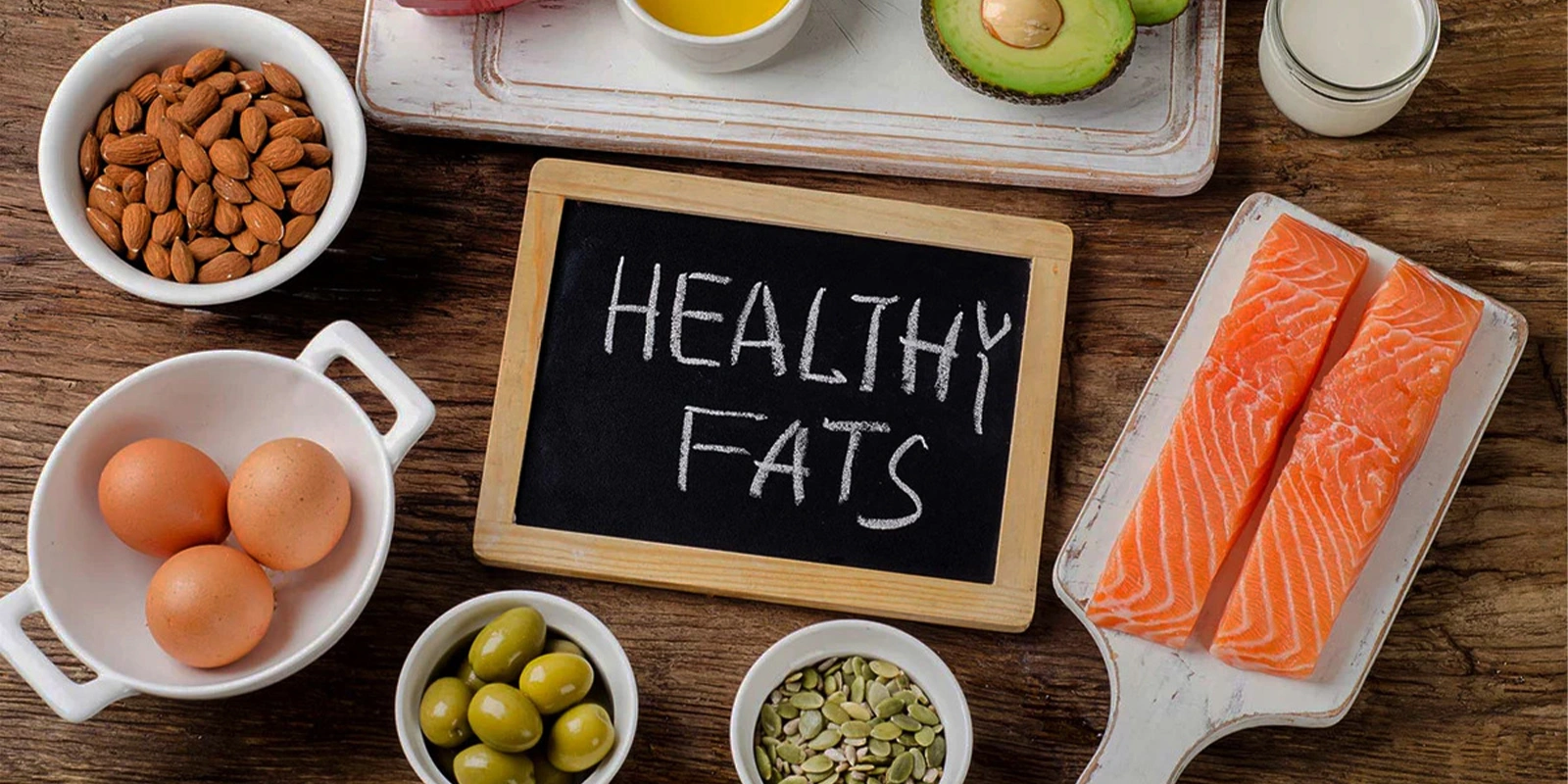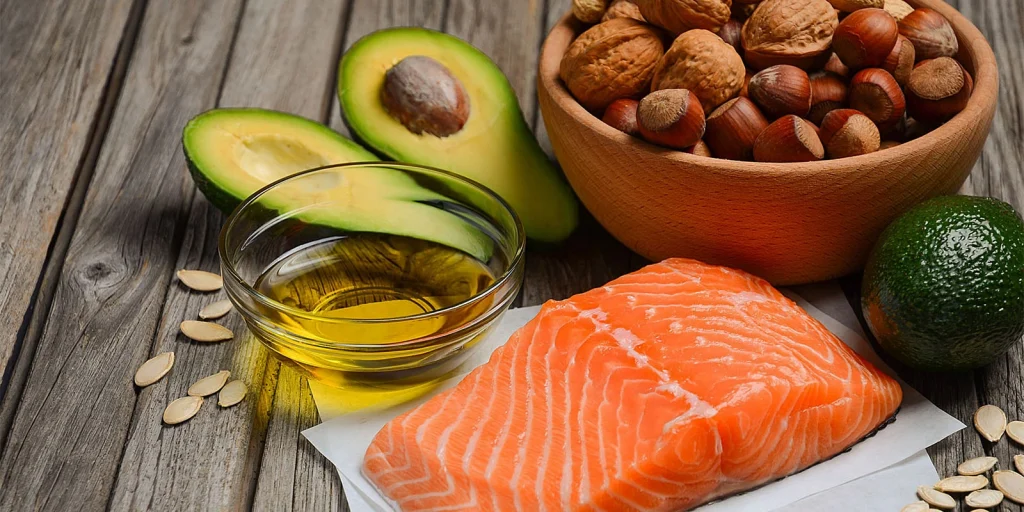


When it comes to sports performance, carbohydrates, and proteins often are the first to be discussed.
However, healthy fats play a crucial role in optimizing athletic performance, aiding recovery, and promoting general health.
In this article on RambodFit, we will explore the important benefits of healthy fats, the different types, and how they can specifically enhance athletes’ performance.
Table of Contents

To help you understand the benefits of healthy fats let’s dive into the fundamentals of fat and its mechanism of it.
For athletes, fat isn’t just a source of calories, it’s an important fuel for endurance and stamina, especially during prolonged exercise.
Fats, or lipids, are an essential macronutrient, alongside carbohydrates and proteins. They play several important functions in the body, such as providing energy, helping in the absorption of vitamins, and playing a role in hormone production.
The term healthy fats typically refers to unsaturated fats both monounsaturated and polyunsaturated which are followed by numerous benefits of healthy fats.
In contrast, trans fats and excessive saturated fats are considered less healthy and should be consumed less.
The key types of healthy fats include:
1. Monounsaturated fats (MUFA):
Found in foods like olive oil, avocados, and nuts, MUFAs are known for their heart-protective effects.
2. Polyunsaturated fats (PUFA):
These include omega-3 and omega-6 fatty acids, which are crucial for brain function, reducing inflammation, and improving heart health. Omega-3s are particularly beneficial for athletes, as we’ll explore later.
3. Omega-3 fatty acids:
A specific type of PUFA, omega-3s especially EPA and DHA are found in fatty fish, flaxseeds, and walnuts, and are crucial for reducing inflammation and supporting muscle recovery.
4. Omega-6 fatty acids:
Found in vegetable oils, seeds, and nuts, omega-6s are also essential, but an imbalance in omega-3 intake can cause inflammatory issues if overconsumed.
5. Saturated fats:
These fats, found in meat, dairy, and coconut oil, aren’t inherently bad but should be consumed in moderation. Athletes can benefit from small amounts, but overconsumption can increase the risk of cardiovascular disease.
The benefits of healthy fats are a lot, especially for athletes if they consume them properly and adequately.
Here are 6 reasons healthy fats can enhance performance:
1. Sustained Energy
Healthy fats provide a dense and long-lasting source of energy. Unlike carbohydrates, which are burned quickly, fats are metabolized slower, providing a steady stream of fuel during prolonged activities. This makes fats especially important for endurance athletes like marathon runners and cyclists.
A 2018 study published in Frontiers in Physiology highlights that endurance athletes who follow a high-fat diet or a ketogenic diet can train their bodies to become more efficient at using fat for fuel.
This process, known as fat adaptation, may spare muscle glycogen and prolong endurance capacity, it’s important to note that not all athletes benefit from low-carb, high-fat diets, and individual responses differently.
2. Enhanced Recovery and Reduced Inflammation
Omega-3 fatty acids, particularly EPA (eicosapentaenoic acid) and DHA (docosahexaenoic acid), have potent anti-inflammatory properties. Athletes experience muscle inflammation and oxidative stress after intense workouts, which can postpone recovery.
Research from PubMed suggests that omega-3 supplementation can reduce muscle soreness and enhance quicker recovery.
3. Improve vascular Health
Cardiovascular health is essential for most athletes, whether they’re swimmers, runners, or weightlifters.
One of the main benefits of healthy fats especially, those found in omega-3s and monounsaturated fats support heart health by reducing LDL cholesterol (the bad cholesterol) and improving HDL cholesterol (the good cholesterol).
Journal of the American College of Cardiology, claims:
omega-3s can reduce the risk of heart disease by lowering blood pressure and preventing the formation of blood clots. For athletes, a healthy heart means improved circulation, more efficient oxygen delivery to muscles, and better overall endurance.
4. Hormone Regulation
Fats are essential for producing hormones, including testosterone and estrogen. Testosterone plays a significant role in muscle growth, repair, and strength making it essential for athletes.
A 2019 study published in PubMed showed that athletes who consumed adequate levels of dietary fats, especially from sources like avocados, nuts, and olive oil, had better hormone balance and improved muscle recovery compared to those on low-fat diets.
Furthermore, other benefits of healthy fats regulate cortisol, the stress hormone that can rise after intense physical activity. High cortisol levels can lead to muscle breakdown and hinder recovery.
By supporting balanced hormone production, fats ensure that athletes can maintain a proper anabolic (muscle-building) environment in their bodies.
5. Support for Brain Function and Focus
Athletes require not only physical strength but also mental sharpness. Healthy fats, particularly omega-3s, play a critical role in brain health.
DHA, a component of omega-3s, is a major structural fat in the brain and is essential for cognitive function. It helps with concentration, focus, and memory, all of which are crucial for athletes to perform at their best.
According to a 2020 review from Examine.com, omega-3 supplementation has been linked to improved reaction times and decision-making skills in athletes.
In sports like basketball, tennis, or soccer, where quick decisions and sharp focus are critical, maintaining optimal brain function can make the difference between a winner and a loser.
6. Body Composition and Fat Burning
Despite the old myth that “eating fat makes you fat,” healthy fats can actually support athletes in maintaining or achieving a lean physique.
Fat consumption, particularly from sources rich in omega-3s and monounsaturated fats, has been shown to enhance body composition by promoting fat oxidation.
A study published in PubMed found that athletes who consumed a diet higher in healthy fats experienced better fat loss and muscle preservation than those on low-fat diets.
Additionally, athletes who include healthy fats in their meals tend to feel fuller for longer, which can help with appetite control and weight management.
Although the benefits of healthy fats are numerous, not all fats are equal.
Here are some best fast sources for athletes:
1. Fatty Fish: Salmon, mackerel, sardines, and trout are excellent sources of omega-3 fatty acids (EPA and DHA), which reduce inflammation and improve recovery.
2. Olive Oil: Rich in monounsaturated fats, olive oil is known for its heart-healthy benefits and is a staple in the Mediterranean diet.
3. Avocados: Avocados are loaded with monounsaturated fats and provide potassium, which helps with muscle function and recovery.
4. Nuts and Seeds: Almonds, walnuts, flaxseeds, chia seeds, and sunflower seeds offer a great mix of monounsaturated and polyunsaturated fats, fiber, and essential minerals.
5. Eggs: Whole eggs, including the yolk, provide a rich source of fats and essential vitamins, like choline, that support brain health.
6. Coconut Oil: While high in saturated fat, coconut oil contains medium-chain triglycerides (MCTs), which are more easily used by the body as energy, making it a popular choice for athletes on a low-carb, high-fat diet.
The ideal fat intake varies based on an athlete’s needs, training intensity, and goals. It would be best to consider that the benefits of healthy fats are related to the amount they are taken.
According to PubMed, it’s overall recommended that athletes get around 20-35% of their daily caloric intake from fats.
The benefits of healthy fats for endurance athletes, especially when training in a low-carbohydrate state to promote fat adaptation, while strength athletes may prioritize moderate fat consumption to support building muscle.
For example:
– Endurance athletes:
A higher fat intake (up to 35% of total calories) may help promote fat oxidation and spare glycogen stores during long-duration activities.
– Strength athletes:
A more moderate fat intake (around 25-30% of total calories) can support hormone production and recovery while focusing on muscle-building.
The benefits of healthy fats for athletes are inevitable and by finishing this article we know that healthy fats are an essential macronutrient for athletes to perform better.
I hope the content was useful for you guys and you can boost your athletic performance by considering these tips about the benefits of healthy fats.
You may also want to check out Examine.com for more nutritional info.
1. Enhance fat metabolism
2. Support joint and muscle health
3. Promote faster recovery
Athletes who do not get enough omega-3 from foods like fatty fish, better consume omega-3 as supplements.
The benefits of healthy fats especially omega-3 are quite useful.